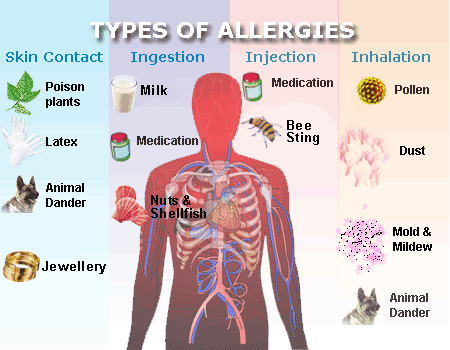
Allergy Resources
Allergic conditions affect millions of people in North America. They can range from being an occasional nuisance to being severe and even life-threatening. Allergies are one of the leading causes of absenteeism at work and school and can significantly impact quality of life. Poor diagnosis and undertreatment can result in increased severity and frequent "attacks". While some people find that allergy symptoms come and go, others are affected year-round.
What Are Allergies?
Allergies can be broken down into three different types: Inhalant, Food, and Chemical. Allergies can be described as an abnormal reaction to a very small amount of a specific substance. Allergic diseases are due to a sensitivity which certain persons develop to normally harmless substances. A susceptible person who is exposed to these substances may have symptoms of the respiratory organs, the digestive organs, or the skin. The most common of these disorders are hay fever, asthma, allergic conjunctivitis, stomach and intestinal disturbances, contact dermatitis, eczema, and hives.
Substances capable of producing allergies are called allergens. The most common allergens include pollen, dust mites, mold, animal dander, insect stings, latex, and certain food and medications.
Learn More About the Different Types of Allergies >What Causes Allergies?

The Allergic/Allergen Load is the entire amount of toxins that you come into contact with that create an allergic response and other factors which may challenge your immune system such as illness, pregnancy, and physical, environmental, or emotional stresses. Your allergic load can be increased by exposure to several allergens in small amounts, or a combination of allergens to which you are mildly allergic and some to which you react severely.
When a particular allergen is absorbed by the body, the range and variety of things to which susceptible persons may become sensitive are almost endless. Sensitivity usually occurs only after repeated exposure to the substance. Allergic patients usually are sensitive to more than one allergen. Certain cells in the tissues manufacture special substances (antibodies) which interact with the allergen. This produces allergic changes in the susceptible tissues; for example, the nasal membrane, bronchial tubes, or skin.

Allergic Load: Bucket Theory
Walls of the Bucket = Your Immune System’s Capacity
Water Level in the Bucket = Summation of your load
Water Overflow = Symptoms
Mat Under the Bucket = Medications
Stress = Lowered Walls of the Bucket & Increased Water Levels
Immunotherapy = Raised Walls of the Bucket
Avoidance Therapy = Allows Less Water in the Bucket
How Did I Become Exposed to Allergens?
Allergens enter the body by various routes:
- By being swallowed- foods, drinks, drugs.
- By being inhaled- dust, pollens, mold spores, fumes.
- By external contacts- clothing cosmetics, industrial products.
- By injection- drugs, serums, vaccines, and insect venoms.
The tendency to become sensitized or allergic to some foreign substances is usually inherited. It is the peculiarity of the inheritance just as the coloring of the eyes. What one will become sensitive to depends in part upon the amount of exposure to any foreign substance or allergen. Thus, an individual who has inherited this tendency to become sensitive to a foreign substance may become sensitive to cow’s milk shortly after birth, may become sensitive to dog hair after acquiring a dog, and throughout his life may develop new sensitivities as a new environment subjects him to new exposures. The previous sensitivities may remain or may be lost when exposure ceases.
Allergy Symptoms
Allergies can manifest as:
- Chronic sinus infection symptoms
- Recurrent ear infections
- Asthma
- Hoarseness
- Post-nasal drip
- Chronic cough
- Itchy eyes/nose
- Sneezing
- Fullness in the ears
- Eczema
- Hives

How to Get Rid of Allergies Fast
Success can be found for managing your symptoms. Minimizing exposure to allergens, managing symptoms with medications, and desensitization with allergy shots are all methods that can be useful in controlling allergic symptoms. Learn About Allergy Treatments >
